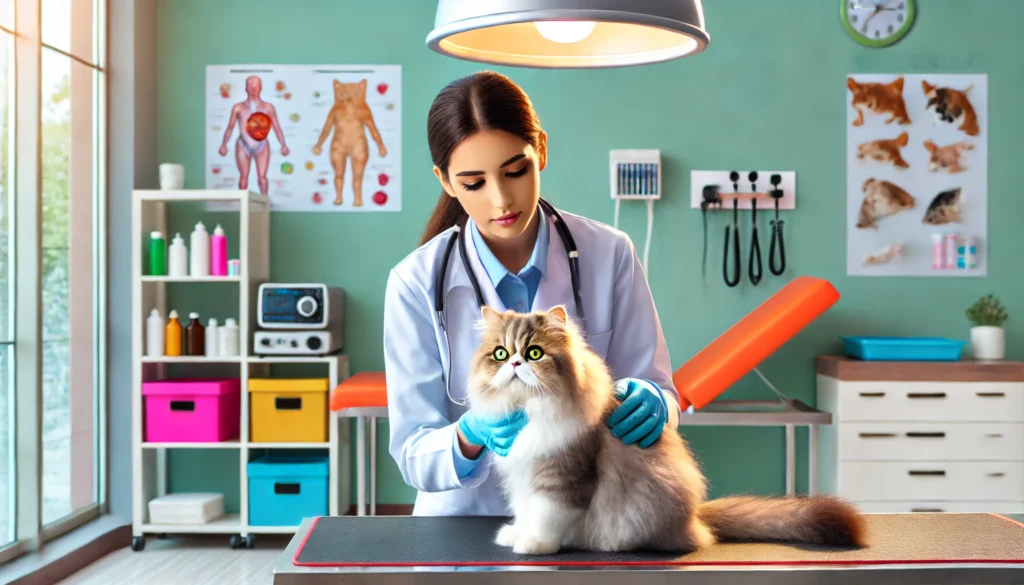Caring for a cat isn't just about feeding and making sure it has a cozy place to sleep. Just like humans, cats are also susceptible to a series of health problems that can compromise their well-being and longevity.
As a responsible owner and feline lover, it's crucial to be aware of the major health issues that can affect your furry friend and, more importantly, know how to prevent them. In this article, we will cover the main health problems in cats and provide valuable tips on how to keep your cat healthy and happy.
Main Health Problems in Cats
Chronic Kidney Diseases
Chronic kidney disease is quite common in cats, especially as they age. This condition occurs when a cat's kidneys can no longer filter toxins from the blood effectively, leading to a range of health complications.
Symptoms and Prevention
Symptoms may include loss of appetite, weight loss, increased thirst and frequent urination. To prevent kidney disease, it is vital to provide a high-quality diet that is high in protein and low in phosphorus. Additionally, ensuring your cat has access to fresh, clean water at all times is essential.
Feline Diabetes
Diabetes in cats is a condition where the body cannot properly produce or use insulin, resulting in high blood glucose levels.
Symptoms and Prevention
Symptoms include increased thirst and urination, weight loss despite increased appetite, and lethargy. Maintaining a healthy weight through a balanced diet and regular exercise is the best way to prevent feline diabetes.
Dental Diseases
Dental disease is a significant concern for cats. Plaque and tartar formation can lead to gingivitis, periodontitis and, eventually, tooth loss.
Symptoms and Prevention
Symptoms of dental problems include bad breath, difficulty eating, and red or swollen gums. Preventing dental disease involves good oral hygiene, such as regular brushing of your cat's teeth and annual visits to the veterinarian for professional cleanings.

Upper Respiratory Infections
Upper respiratory infections, caused by viruses and bacteria, are common in cats, especially those in community settings like shelters.
Symptoms and Prevention
Symptoms include sneezing, runny nose and eyes, and fever. Regular vaccination is key to preventing these infections. Maintaining a clean environment and reducing stress also helps prevent the spread of these diseases.
Skin and Coat Problems
Skin and coat problems can range from allergies to parasite infestations such as fleas and mites.
Symptoms and Prevention
Symptoms include itching, redness, hair loss and sores. Prevention involves regular use of antiparasitic treatments, maintaining a healthy diet and providing a stress-free environment.
Gastrointestinal Problems
Gastrointestinal problems, such as vomiting and diarrhea, are common in cats and can be caused by a variety of factors, including poor diet and infections.
Symptoms and Prevention
Symptoms include frequent vomiting, diarrhea, loss of appetite and lethargy. Preventing gastrointestinal problems involves feeding your cat a balanced diet and avoiding abrupt changes in diet.
Hyperthyroidism
Hyperthyroidism is a common condition in older cats characterized by excessive production of thyroid hormones.
Symptoms and Prevention
Symptoms include weight loss, increased appetite, hyperactivity, and increased thirst and urination. Although there is no guaranteed way to prevent hyperthyroidism, monitoring your cat's health regularly and having annual blood tests can help with early detection.
Urinary Problems
Urinary problems, such as cystitis and stone formation, can be extremely painful and dangerous for cats.
Symptoms and Prevention
Symptoms include difficulty urinating, urinating outside the litter box, and blood in the urine. To prevent urinary problems, offer a balanced diet and encourage water intake, as well as keeping the litter box clean and in a quiet place.
Obesity
Obesity is a growing problem among domestic cats and can lead to a number of health complications, including diabetes and joint problems.
Symptoms and Prevention
The most obvious symptom is being overweight. Preventing obesity involves providing an adequate diet and ensuring your cat exercises regularly.
Internal and External Parasites
Parasites, such as fleas, ticks and worms, can cause a range of health problems in cats.
Symptoms and Prevention
Symptoms include intense itching, hair loss, and, in cases of worms, weight loss and diarrhea. Prevention is done through the regular use of antiparasitic treatments and environmental control.

Treatments and Preventive Care
Proper Nutrition
A balanced diet is essential for your cat's overall health. High-quality foods, rich in essential nutrients, help keep the immune system strong and prevent various diseases.
Constant Hydration
Cats are known for not drinking much water. However, hydration is crucial to prevent urinary and kidney problems. Offer fresh water and consider water fountains to encourage drinking.
Regular Veterinary Exams
Regular veterinary appointments are essential for monitoring your cat's health and detecting problems early. Vaccinations and annual check-ups help keep serious illnesses under control.
Parasite Control
Use preventive treatments for fleas, ticks and worms. Maintaining a clean, parasite-free environment is also crucial to your cat's health.
Dental Hygiene
Regularly brushing your cat's teeth and using specific dental products helps prevent dental disease and ensures oral health.
Enriched Environment
Providing an enriched environment with toys, scratching posts and rest areas helps reduce stress and promotes your cat's mental health.
Conclusion
Keeping your cat's health up to date requires a combination of vigilance, prevention and regular care. By being aware of the main health problems that can affect your feline friend and taking appropriate preventative measures, you will be ensuring a long and happy life for him. Always remember to consult a veterinarian at the first sign of trouble, as early intervention is the key to effective treatment. Thus, with knowledge and dedication, you can provide your cat with a full and healthy life.
FAQ
1 – What are the main symptoms of kidney disease in cats?
Symptoms include loss of appetite, weight loss, increased thirst and frequent urination.
2 – How to prevent diabetes in cats?
Maintaining a healthy weight through a balanced diet and regular exercise is essential.
3 – What causes upper respiratory infections in cats?
These infections are usually caused by viruses and bacteria, common in community settings like shelters.
4 – How can I take care of my cat’s dental health?
Regular tooth brushing and annual vet visits for professional cleanings are recommended.
5 – What are the symptoms of hyperthyroidism in cats?
Symptoms include weight loss, increased appetite, hyperactivity, and increased thirst and urination.
6 – How to prevent urinary problems in cats?
Offer a balanced diet, encourage water intake and keep the litter box clean and in a quiet place.
